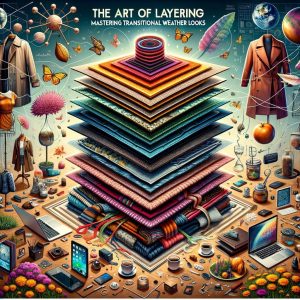“Fashion Icons: Styles That Changed the Industry Forever”
In the ever-evolving tapestry of fashion, certain figures emerge not just as trendsetters but as revolutionaries, reshaping the very fabric of what we wear and how we express ourselves. delves into the lives and legacies of those individuals whose unique visions and bold choices transcended the catwalk, leaving an indelible mark on the industry. From the flapper dresses of the Roaring Twenties to the grunge aesthetics of the ’90s, we will explore the pivotal moments and standout personalities that have inspired generations, challenging societal norms and redefining beauty in their wake. Join us on a journey through styles that not only adorned bodies but also ignited movements, sparked conversations, and forever altered the landscape of fashion as we know it.
Revolutionary Trends and Their Trailblazers
Throughout the years, the fashion industry has witnessed a series of disruptive trends that have redefined style and culture. Icons such as Coco Chanel revolutionized women’s wear by introducing relaxed silhouettes that liberated women from the constraints of corsetry. Meanwhile, David Bowie and his alter ego, Ziggy Stardust, challenged gender norms with flamboyant styles that blurred the lines between masculine and feminine. The rise of streetwear, driven by influencers like Virgil Abloh, has also marked a significant shift, merging high fashion with urban subcultures and making exclusive designs accessible to the masses.
In addition to these legacy-makers, modern trailblazers continue to inspire with their innovative approaches. Rihanna, through her Fenty brand, has made waves by embracing diversity and inclusivity in fashion, proving that representation matters in every collection. Similarly, Kanye West’s creative visions with Yeezy have transformed sneaker culture and sparked conversations about the future of apparel. The table below highlights some of the most influential fashion icons and their defining styles:
| Icon | Signature Style | Impact on Fashion |
|---|---|---|
| Coco Chanel | Classic simplicity; Little Black Dress | Redefined femininity and elegance |
| David Bowie | Androgynous glam; Bold colors | Shattered gender conventions |
| Rihanna | Inclusive and edgy; Athleisure | Advocated for diversity in fashion |
| Kanye West | Minimalist aesthetics; Streetwear | Revolutionized modern sneaker culture |
Enduring Influence of Pioneering Fashion Houses
The legacy of pioneering fashion houses continues to resonate in the contemporary landscape, defining not only trends but shaping the very essence of what fashion represents today. These brands have consistently pushed boundaries, introducing innovative designs and inspiring countless designers across generations. From Chanel’s revolutionizing of women’s wear with the introduction of the little black dress to the audacious color palettes and silhouettes of Yves Saint Laurent, these fashion powerhouses have laid down the pillars upon which modern fashion is built.
Their influences can be observed in various facets of the industry, including marketing strategies and the tumultuous relationship between fashion and popular culture. Consider the impact of the following fashion houses:
| Fashion House | Key Innovation |
|---|---|
| Gucci | Opened the door to gender-fluid fashion. |
| Dior | Introduced the New Look that emphasized femininity. |
| Prada | Pioneered the concept of luxury streetwear. |
| Balenciaga | Redefined structural fashion with avant-garde designs. |
These houses not only reflect the changing tides of society but also advocate for diversity and sustainability in fashion. Their commitment to craftsmanship and narrative through clothing continues to inspire new talent and challenge the status quo, making their enduring influence an integral part of the fashion ecosystem.
Breaking Gender Norms: The Shift Towards Inclusivity
The fashion landscape is undergoing a transformative evolution as designers and icons challenge traditional boundaries and usher in a new era of expression. This shift invites wearers to embrace styles that reflect their personal identity rather than conforming to societal expectations. Iconic figures such as David Bowie and Harry Styles have not only blurred the lines of gendered fashion but have also propelled conversations about self-expression across a diverse demographic. Their fearless embrace of eclectic designs has inspired countless individuals to step away from conventional wardrobes, promoting a culture where everyone feels empowered to discover and showcase their authentic selves.
Inclusivity in fashion transcends mere aesthetics; it fosters a community that celebrates individuality. Modern brands are responding to this change by adopting more versatile and fluid designs. Key trends include:
- Gender-neutral collections: Designers increasingly create pieces that cater to all, enabling a broader audience to partake in a shared sartorial experience.
- Size diversity: Expanding sizing options acknowledges and embraces all body types, ensuring that fashion is truly for everyone.
- Sustainable practices: An emphasis on eco-conscious fashion reflects a societal shift towards responsibility and caring for our planet.
With these developments, the industry’s focus on breaking down barriers not only underscores the importance of representation but also highlights the transformative potential of clothing. The emergence of such fashion movements infuses creativity with purpose, making it an exciting time to witness how inclusivity shapes the essence of modern style.
Sustainable Fashion: Icons Leading the Eco-Conscious Movement
The rise of eco-consciousness in the fashion industry has been propelled by influential icons redefining what sustainability means. These trailblazers not only incorporate sustainable practices into their designs but also advocate for a broader change within the industry. Their influence extends beyond just aesthetics; they inspire consumers to consider the environmental impact of their purchases. Among the most notable figures are:
- Stella McCartney - Pioneering animal-friendly luxury, she has made strides in using organic and recycled materials.
- Rei Kawakubo – Known for challenging fashion norms, her innovative designs often highlight the importance of sustainability.
- Eileen Fisher – Committed to circular fashion, her brand emphasizes longevity and ethical labor practices.
- Emma Watson – As a vocal advocate for sustainable fashion, she uses her platform to promote ethical brands.
These icons are forging a new path in an industry traditionally driven by trends and fast production. They lead by example, showing that fashion can be both stylish and sustainable. Their efforts are evidenced by an increased awareness among consumers and a gradual shift in industry standards. A closer look at their contributions reveals a tapestry of impactful initiatives, from reducing waste to embracing ethical sourcing. The future of fashion is undoubtedly interwoven with the principles set forth by these leaders, marking a significant turning point in how style and sustainability coexist.
| Icon | Contribution |
|---|---|
| Stella McCartney | Organic & recycled materials |
| Rei Kawakubo | Challenging fashion norms |
| Eileen Fisher | Circular fashion & ethical labor |
| Emma Watson | Advocacy for ethical brands |
In Summary
As we conclude our exploration of the remarkable fashion icons who have indelibly shaped the industry, it becomes clear that style is not merely an aesthetic choice; it is a powerful form of expression that transcends time, culture, and societal boundaries. Each of the figures discussed in this article has left behind a legacy that challenges conventions and inspires innovation, reminding us that fashion is always evolving.
From the audacious designs of Coco Chanel that liberated women from the constraints of corsetry to the bold statements made by figures like David Bowie, who blurred the lines of gender and identity, the impact of these icons is woven into the very fabric of fashion history. Their ability to push boundaries and provoke thought has paved the way for new generations of designers, artists, and influencers who continue to redefine what it means to be stylish.
As we look toward the future, let us celebrate the eclectic tapestry of influences that shape our wardrobes and inspire creativity. Fashion, at its core, is a reflection of our collective identity, one that is continually molded by those willing to challenge the status quo. May we honor the visionaries of the past as we embrace the possibilities of the present and future, reminding ourselves that style is not just about what we wear—it’s about who we are.













Post Comment